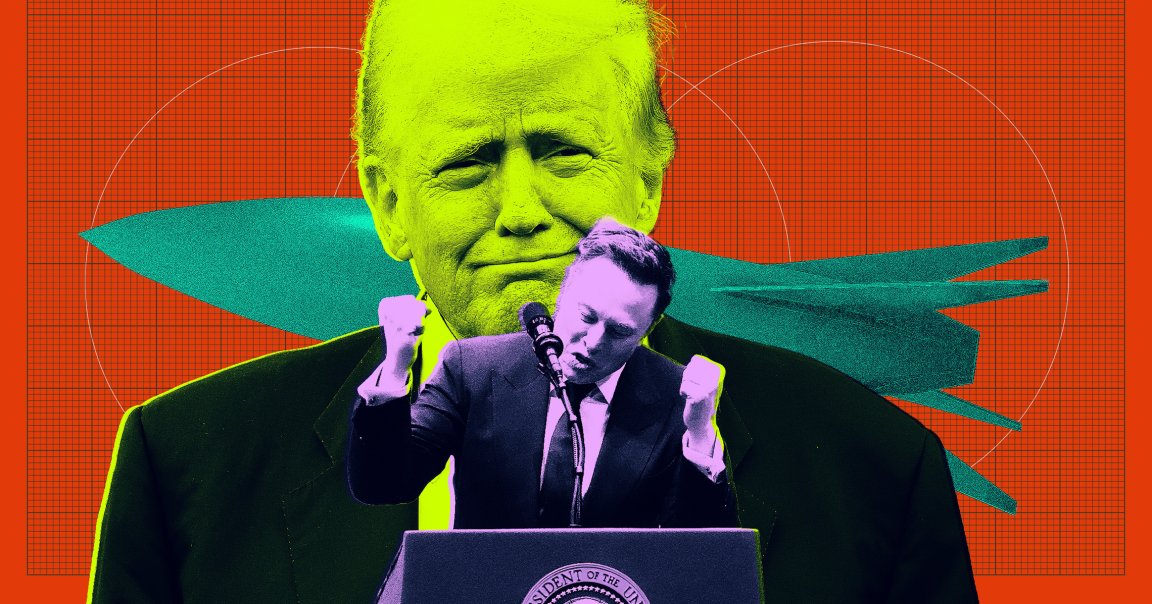
Their friendship may be over, but president Donald Trump just handed Elon Musk and his company SpaceX a major boon by brushing aside major environmental regulations.
On Wednesday, Trump signed an executive order to accelerate space launches by effectively deregulating the industry. As part of this push, the Federal Aviation Administration is directed to “eliminate or expedite” environmental reviews — an obstacle that has been a persistent thorn in Musk’s side.
Covering all its bases, the order also directs Secretary of Transportation Sean Duffy, who oversees the FAA, to “eliminate outdated, redundant, or overly restrictive rules for launch and reentry vehicles.”
“Inefficient permitting processes discourage investment and innovation, limiting the ability of US companies to lead in global space markets,” a statement from the White House reads. “Overly complex environmental and other licensing and permitting regulations slow down commercial space launches.”
This is great news for the commercial space industry, and for Musk especially, whose company SpaceX remains an out-and-out leader. But it’s terrible news for the environment, as rocket launches — even when they proceed smoothly — can disrupt local wildlife, and at worse, cause habitat destruction. And with the executive order, companies like SpaceX and Jeff Bezos’ Blue Origin are being trusted to regulate these issues themselves.
“This reckless order puts people and wildlife at risk from private companies launching giant rockets that often explode and wreak devastation on surrounding areas,” Jared Margolis, a senior attorney for the Center for Biological Diversity, said in a statement, per Ars Technica.
SpaceX launches far more rockets than any of its competitors, and its spacecraft remain a cornerstone of NASA’s space ambitions. But in recent years, SpaceX has become mired in controversy due to the struggling development of its Starship megarocket, which has exploded midair on several occasions, including on its inaugural launch.
Much attention has been paid to the damage this causes to its surroundings. On its first test flight in 2023, the burning chunks of Starship’s obliterated launchpad — which SpaceX was criticized for not implementing standard practices in the industry to prevent from happening — lit a nearby state park on fire, stunning wildlife officials.
More recently, in a test flight this January, Starship exploded over the Caribbean, raining chunks of fiery debris down onto the ocean. Some of that rocket detritus landed on nearby islands, angering residents and reportedly causing property damage.
When Starship exploded yet again during a June test, the debris that pelted beaches in northern Mexico struck and killed protected wildlife, including dolphins and sea turtles, activists allege.
Incidents like these have prompted the FAA to ground Starship and launch environmental reviews — much to the chagrin of Musk, who’s made no secret of his contempt for the agency, adamant that nothing should stand in the way of his grand vision of getting to Mars. Prior to Trump’s inauguration, Musk had openly called for the resignation of the previous FAA chief, Mike Whitaker, under whose leadership the agency temporarily halted Musk’s rocket launches.
In addition to clearing the way for quicker space launches, the order also aims to streamline spaceport construction by removing “duplicative,” or redundant, regulations. What that looks like in practice, Ars Technica observed, is limiting the authority of states to regulate spaceport construction under their local laws.
This comes at a key moment for the commercial spaceflight industry, as companies are rushing to launch thousands of satellites into orbit, in a bid to compete with Musk’s Starlink.
But if launches are set to soar across the nation, as this order hopes to help make happen, then that arguably raises the risk to public safety.
“Bending the knee to powerful corporations by allowing federal agencies to ignore bedrock environmental laws is incredibly dangerous and puts all of us in harm’s way. This is clearly not in the public interest,” Margolis said in the statement.
More on SpaceX: Elon Now Facing the Possibility That SpaceX Will Never Get Starship Working